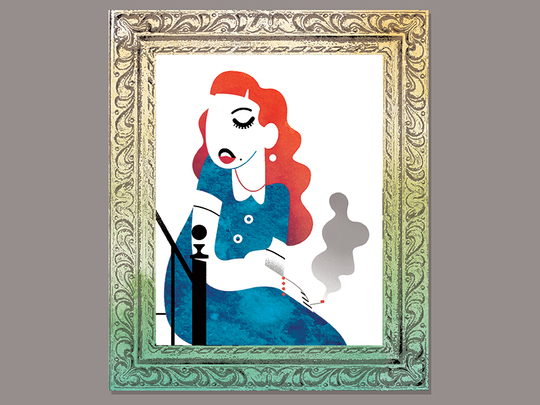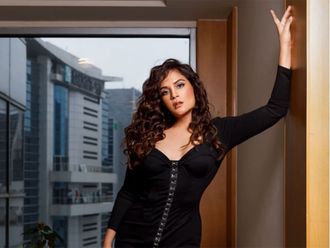
Nicotine
By Nell Zink, Ecco, 304 pages, $27
Nicotine is an addictive stimulant, and so is “Nicotine”, the new novel by Nell Zink. Following her widely admired debut, “The Wallcreeper”, in 2014, and a second novel, “Mislaid”, in 2015, “Nicotine” is intellectually restless, uniquely funny and, I would argue, her best yet.
Its disarming heroine, 23-year-old Penny Baker, was brought up around sweat lodges and drum circles, the daughter of “animist drug freaks”; when we catch up with her in 2016 she’s in possession of a business degree and tending her father, Norm, an ageing healer-guru, in a hospice. The affection between them is palpable. Penny proves herself caring and loyal — a truepenny — during Norm’s decline, which Zink has artfully fashioned as the overture to the high-spirited comedy that makes up the rest of the novel.
In need of a place to live, Penny visits Jersey City to check out her father’s abandoned childhood home, where she finds that the house has been named Nicotine and is occupied by an approachable band of squatters, ostracised by other activist households because of their tobacco habits. The group at Nicotine — Rob, Jazz, Sorry, Anka and Tony — has a motley collection of aims. As Sorry puts it: “Live one day at a time, and try to afford cigarettes by living in New Jersey.”
Penny is smitten right off not only with the freegan scavenger Rob but with the entire collective scene. At Tranquility, a nearby house where Penny interviews for a room, she’s game for any topic on the table, which in this case happens to be the awesomeness of puppets: “Why shouldn’t loving puppets be a revolutionary act, in a world where so many people love drone warfare? ... Puppets it is! Big ones!”
Faced with Sunshine, a man most often seen in the kind of footed sleeper also known as a onesie, she’s ready with a compliment: “There’s dignity in trying to save energy.” In this new milieu, Penny herself is quickly prized. “Having been called ‘koala’ half her life, she knows she has a cara de buena persona. She also knows that her body’s bootylicious.”
The novel develops around Penny’s psychic replenishment, her hairy family relationships and the fate of Nicotine and its residents. Zink’s narrative is propulsive, wonderfully stuffed with irreverent and absorbing banter among these characters who move in slightly off-kilter orbits, as if their wills are counterweighed by ballasts of personal history that we can only guess at. Here, for instance, is Jazz on sexuality: “To me, eroticism is transcendent. It has a will of its own.” And here’s Penny, decrying the save-the-world claims that start-up companies make to their investors, even when all they’ve got is “an app that tells you when to refill the dog dish.” And Anka, commenting on Rob’s popularity: “It’s a market. The heterosexual economy that Rob dominates with his scarcity.”
The nastiest threat to everyone’s happiness comes from Penny’s half brother, Matt, who designs ultrasleek garbage trucks, drives an Audi A5 and dumps women as fast as he can pick them up and maul them. When Matt is asked by Penny’s mother, now a bank executive, once an indigenous Kogi runaway from Colombia, to rid the Jersey City house of the squatters, he responds: “I don’t know why you’re in such a rush. It’s like having bedbugs that do the dishes.”
Likewise, after their first exposure to Matt, the inhabitants of Nicotine are on alert: “That man has a hard-core Satanist vibe. Like he swore on a goat’s carcass to be a sociopath.” But it’s the adventurer Jazz who says, “I thought he was hot,” and the wild stuff unleashed between them plays out the shadow side of desire like a coup de foudre wrapped in a death wish.
Maybe what’s most bootylicious in this novel is Zink’s warmhearted embrace of her subjects. With a straight face, she gives them space to do their quixotic thing. The book affirms that there’s salvation to be had in connection, no matter how gnarly, and that includes a karmic comeuppance involving 52 precariously perched buckets of human waste. I won’t say more.
In the early scenes, Penny is reading to her father from Norman O. Brown’s “Life Against Death”, a copy of which happens to sit on my shelf. Maybe they’re reading the section in which Brown writes that Freud, in “Wit and the Unconscious”, “affirms the connection between art and childishness; however, childishness is not a reproach, but the ideal kingdom of pleasure which art knows how to recover.”
This pleasure is what Zink understands. The book works towards the achieving of a comic Utopia, the lost kingdom of childishness. As much as one is aware of their vulnerabilities, one enjoys every minute with these obliging kooks.
–New York Times News Service
Elizabeth McKenzie’s latest novel is “The Portable Veblen”.









